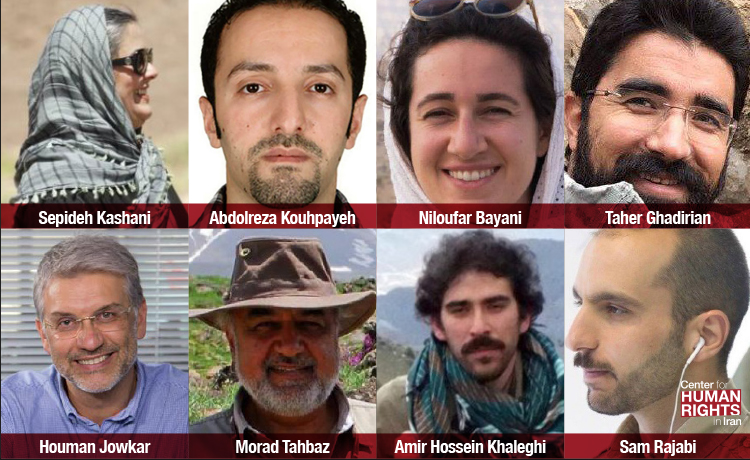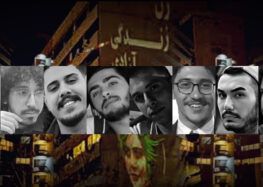Iran Charges Environmentalists With National Security Crimes

Prosecutions Lacking Due Process Aimed at Deflecting Attention from Death of One of the Detainees
October 23, 2018 – Nine months after a group of environmentalists were imprisoned in Iran without any evidence of wrongdoing and denied due process—and after the death of one them in state custody—five of them have been charged with a serious national security crime.
“Instead of investigating the death in state custody of Kavous Seyed-Emami, Iranian authorities have spent the past nine months cooking up cases against his colleagues,” said Hadi Ghaemi, executive director of the Center for Human Rights in Iran (CHRI).
“The Iranian judiciary should correct these egregious abuses of detainee and due process rights and allow an impartial and independent investigation into the unexplained death of Dr. Seyed-Emami,” he added.
Attorney Mohammad Hossein Aghasi, who has been officially allowed to represent one of the detainees, Sam Rajabi, and is trying to get permission to represent Taher Ghadirian, told CHRI on October 22, 2018, that five of the eight detainees have been charged with “corruption on earth.”
The detainees charged with “corruption on earth” are Houman Jowkar, Taher Ghadirian, Morad Tahbaz, Sepideh Kashani and Niloufar Bayani.
Three others—Amir Hossein Khaleghi, Sam Rajabi and Abdolreza Kouhpayeh—have still not been charged. All eight of them are being held in Evin Prison’s Ward 2-A which is under the control of the Islamic Revolutionary Guard Corps (IRGC).
Aghasi added that Tehran Prosecutor Abbas Jafari Dolatabadi had changed the charge from “espionage” to “corruption on earth” after he allegedly received a letter from “the army.”
Aghasi said he is unaware of the contents of the letter in question. He added that the charges were issued to the detainees on October 6, 2018, by Branch 2 of the Revolutionary Magistrate in the presence of lawyers appointed to the detainees by the court.
The eight detainees have only occasionally been allowed to call their families or receive family visits. They were denied access to legal counsel for nine months until October, when some of them were told to choose their lawyers from a list approved by the judiciary.
According to the Note to Article 48 of Iran’s Criminal Procedures Regulations, detainees accused of national security charges can be stripped of their due process and prisoners’ rights, including the right to choose their own lawyer.
It is unclear why some of the detainees have been allowed to choose their own lawyer.
“The Iranian judiciary should allow all detainees unrestricted access to lawyers of their choice in accordance with Iran’s international obligations,” said Ghaemi.
The International Covenant on Civil and Political Rights (ICCPR), which Iran is a signatory to, recognizes in Article 14, subsection (3)(d), the right of an accused in criminal proceedings to be represented by legal counsel of his or her choice.
Aghasi told CHRI he doesn’t understand why the original charge was changed.
“We are dealing with a very strange accusation,” said Aghasi. “I completely object to this charge,” he added.
Corruption on earth is an extremely serious charge in the Iranian penal code that pertains to national security. The maximum penalty for this charge is death.
“Previously, the authorities were accusing [the detainees of] cooperation with foreign governments and agencies, so I don’t know how that has now changed to ‘corruption on earth,” he said.
No Accountability for Kavous Seyed-Emami’s Death
Nine environmentalists were detained in Iran between January 24 and 25, 2018, after being arrested by agents of the Islamic Revolutionary Guard Corps’ (IRGC) Intelligence Organization.
One of them, Iranian Canadian sociologist Kavous Seyed-Emami, was pronounced dead to his wife by security agents on February 9, 2018.
No one has been held accountable for Seyed-Emami’s death, which a judicial official claimed was a suicide, before there was an autopsy. A so-called “fact-finding” commission set up by President Hassan Rouhani to investigate the deaths of at least five detainees, including Seyed-Emami, in state custody this year has also failed to announce any findings eight months after its creation.
Instead, Iranian authorities have harassed Seyed-Emami’s widow, Maryam Mombeini, including by banning her from leaving the country, raiding her home and repeatedly interrogating her.
They have also kept eight of Seyed-Emami’s colleagues behind bars despite the country’s own Intelligence Ministry asserting that there is no evidence to justify their continued incarceration and calls for their release by Iranian officials and the UN.
“No Evidence That These Individuals Were Spies”
In May 2018, the head of Iran’s Department of Environment, Vice President Isa Kalantari, refuted accusations that the environmentalists were spies, pointing to the conclusions of Rouhani’s own Intelligence Ministry and fact-finding committee.
“It has been determined that these individuals were detained without doing anything,” Kalantari said. “The Intelligence Ministry has concluded that there is no evidence that these individuals were spies.”
“The [Rouhani] government’s fact-finding committee [also] concluded that the detained activists should be released because there’s no evidence to prove the accusations leveled against these individuals,” he added.
Kalantari went further in an interview with the Islamic Republic News Agency (IRNA) on August 13, 2018, saying, “The judiciary has ordered us not to get involved…They told us this is none of our business and we shouldn’t pursue it.”
Kalantari added, “The esteemed intelligence minister has repeatedly said there is no evidence that the detainees had spied and yet the judiciary has still not resolved their situation. Almost all of our NGOs are at a standstill because they don’t know to what extent they can operate without being accused of spying.”
On October 22, Mohammad Reza Tabesh, the leader of the environmentalist faction in Iran’s Parliament, said he was shocked by the new charge against the environmentalists and demanded the detainees be given access to lawyers.
“We pushed for the case against the environmentalists to be sent to the judiciary. Last week we met with [Judiciary Chief Sadegh] Larijani and he had a talk with Dowlatabadi and eventually Mr. Dowlatabadi promised to submit the case to judicial authorities,” he said.
“We hope this will happen as soon as possible and these individuals will be able to exercise their rights, including having a lawyer,” he added.
Tabesh also urged President Rouhani’s fact-finding commission to investigate the new charge.
“Based on the information that has been made public by the Iranian authorities, nothing justifies the continued incarceration of these eight environmentalists, let alone charges levelled against them that could carry the death sentence,” said Ghaemi.
“One detainee has already lost his life during this travesty of justice,” said Ghaemi. “Iran should immediately release the remaining detainees to prevent further loss of innocent life.”






